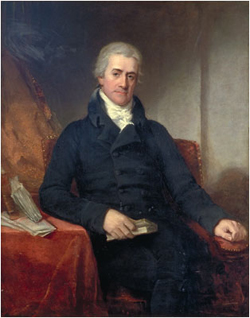
It’s a very big day today. It’s National Thesaurus Day. (It’s also Winnie the Pooh Day, and Peking Duck Day, but we at Glossophilia are most interested in our man of words.) January 18, 1779 was the birth date of Peter Mark Roget, who would grow up to become a physician, theologian and lexicographer, earning fame for the publication of his Thesaurus of English Words and Phrases (known as Roget’s Thesaurus) in 1852. (Most people probably don’t realize that Roget also invented an improved slide rule and the pocket chessboard; he was a man of many talents.) Battling depression for most of his life, Roget found comfort in creating lists, the process of which he found therapeutic and calming. His ultimate list was the book that would become one of the most widely used dictionaries in the world. In its original printing, Roget’s work — a catalogue of words organized by their meanings — was called Thesaurus of English Words and Phrases Classified and Arranged so as to Facilitate the Expression of Ideas and Assist in Literary Composition. And that is exactly what Roget’s Thesaurus has done for generations of thinkers, speakers and writers over the last century and a half, helping us to think outside our narrow linguistic tool-boxes and reach for more colorful, unusual synonyms to brighten up and refresh our weary old vocabularies.
There’s perhaps no other lingo more rife with hackneyed words and phrases than that of PR and marketing, the field in which I work; Roget must be wondering in his grave why more marketing executives haven’t bought his book. (Perhaps his publicist didn’t have a wide enough vocabulary to promote it.) Some examples that rarely get past my red pen are feature/featuring, “highly acclaimed”, “highly anticipated”, rave, and renowned. And oh how I wish, in my specific field of classical music, that someone would invent a few more words for perform and performance.
To mark this auspicious day, let’s take a look at Lake Superior State University’s 38th annual List of Words to be Banished from the Queen’s English for Misuse, Overuse and General Uselessness.
http://www.lssu.edu/banished/
In the university’s own words on the List’s dedicated web site: “While the U.S. Congress has been kicking the can down the road and inching closer to the fiscal cliff, the word gurus at Lake Superior State University have doubled-down on their passion for the language and have released their 38th annual List of Words to be Banished from the Queen’s English for Misuse, Overuse and General Uselessness.
The list, compiled from nominations sent to LSSU throughout the year, is released each year on New Year’s Eve. It dates back to Dec. 31, 1975, when former LSSU Public Relations Director Bill Rabe (RAY-bee) and some colleagues cooked up the whimsical idea to banish overused words and phrases from the language. They issued the first list on New Year’s Day 1976. Much to the delight of word enthusiasts everywhere, the list has stayed the course into a fourth decade.
Through the years, LSSU has received tens of thousands of nominations for the list, which is closing in on its 1,000th banishment.”
Here is 2012’s List of Words to be Banished from the Queen’s English for Misuse, Overuse and General Uselessness.
Fiscal cliff
Kick the can down the road
Double down
Job creators/creation
Passion/passionate
YOLO
Spoiler alert
Bucket list
Trending
Superfood
Boneless wings
Guru


